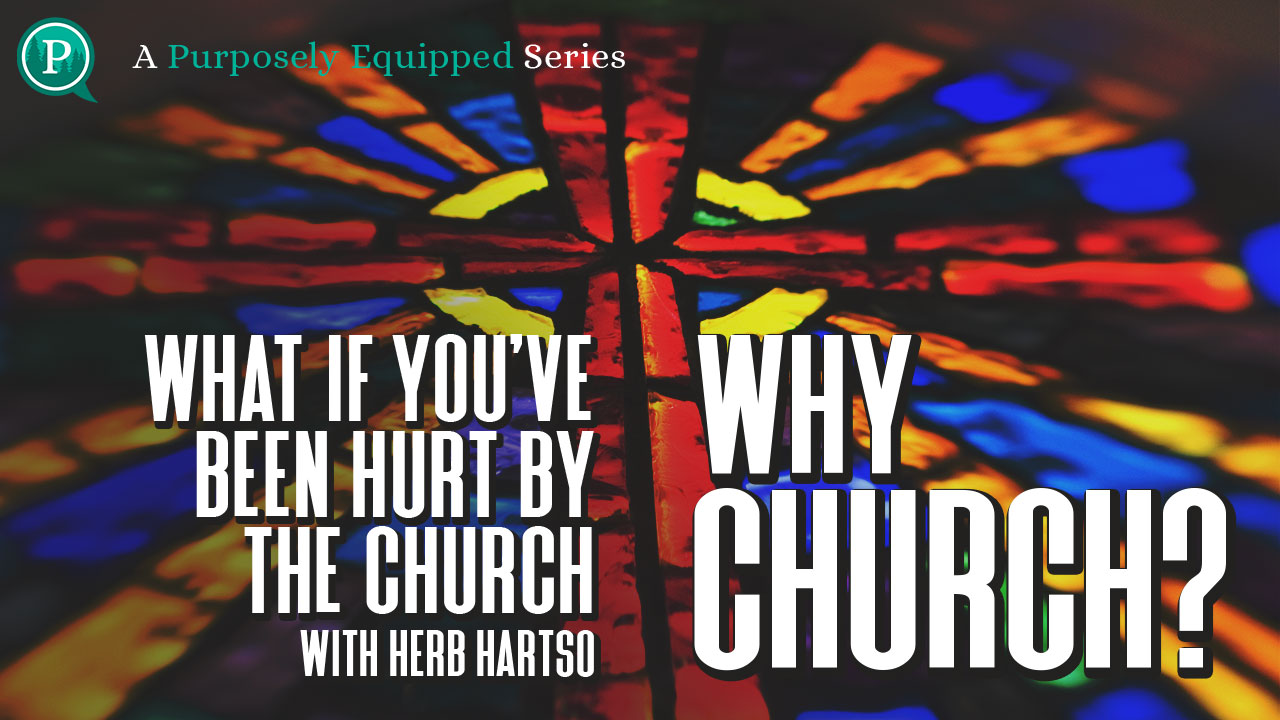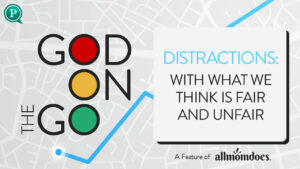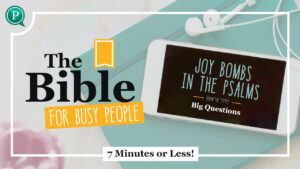It’s a question no one wants to tackle, but we’re going there today as we discuss how to handle being hurt by the Church. Herb Hartso of Antioch Bible Church joins Mark Holland today as we dig into this challenging topic.
Show Notes:
Find Herb: Online | Instagram | Facebook
- We’d love for you to leave a review. We know most of our listeners come from Apple podcasts and if that is you, please take a moment to rate the podcast and tell us what you loved about this episode. It helps us reach more people!
Transcription:
Mark Holland:
And another part of our Purposely Equipped series, Why Church? We’ve dealt with what is church, should we expect churches to be perfect. We’re onto another question now that actually, when we were looking for pastors to participate, nobody wanted to touch this particular question. But we got a gentleman who took it on and he wants to talk about it.
And that is, what if you’ve been hurt by the church? How to overcome hurt, church hurt, as they say, as Herb Hartso says. Herb Hartso, the senior pastor of Antioch Bible Church in our area. Where is Antioch? Is that in Redmond, or where is Antioch?
Herb Hartso:
We have offices in downtown Redmond and we meet at a school in Kirkland. But Mark, one thing about my vision for Antioch is that we get a permanent building. So Antioch is almost 40 years-old.
Mark Holland:
Yeah. You guys still don’t have a permanent building?
Herb Hartso:
It’s always been portable, but now is the season for us to get a permanent building. So our 40-year anniversary is October 7th, 2024. And we’re praying at that time heading into 2025 that God will give us a permanent building. So we’re really excited about that.
Mark Holland:
Well, it’s an exciting church. People might remember Ken Hutcherson was the pastor there for many years. Very visible pastor. Of course he was a, was he a Seahawk or was he several different NFL positions? I know that he was in the NFL.
Herb Hartso:
Yeah, I think he played for a few teams and his wife and his kids still attend Antioch.
Mark Holland:
They do.
Herb Hartso:
And they are fantastic. Love them.
Mark Holland:
Okay. And I remember it was a very multi-ethnic church too.
Herb Hartso:
Still is.
Mark Holland:
Still is.
Herb Hartso:
And that’s the DNA. And one of my friends who’s a pastor in Tennessee, he said, “Herb, Hutch was one of the first to do it. He was one of the first in America to do multicultural ministry.” And Mark, I am, my father is African American and Japanese, my mom is white. So I grew up in this kind of multi-ethnic kind of makeup. And so this has been my life. So to pastor a multi-ethnic church is just a joy for me.
Mark Holland:
You seem like created just for that job. Well, you’ve been there since about what, July of 2020, came in as the pandemic was heating up, and obviously a lot of hurt and misunderstanding happened through that.
We won’t get into that, but that was a baptism by fire for any pastor. I’ve talked to a lot of pastors and they all just are so glad that’s over.
Herb Hartso:
Yes, it took up a lot of time. And for me as a new senior pastor at Antioch, I wanted to meet people and their face was covered and things of that nature. But by God’s grace we were able to navigate through that and kind of stabilize. And now we’re growing and it’s very exciting seeing a lot of new guests, a lot of young people, launching new ministries, God is doing a great work.
Mark Holland:
You have a background. You’re an athlete too, like Huthcerson was.
Herb Hartso:
Yes.
Mark Holland:
You weren’t a professional athlete, or were you?
Herb Hartso:
No, not quite like Hutch, but I played basketball growing up. So I’m from the area, grew up in Tacoma and graduated from Stadium High School and played basketball.
Mark Holland:
Is that the Castle High School?
Herb Hartso:
It is. It is.
Mark Holland:
Cool.
Herb Hartso:
253 Tacoma. And then I went to school at UDub. At UDub, I was doing a lot of weightlifting and was invited to walk on the football team, so I was a walk-on linebacker, so that was fun. And then after college I actually did some traveling with the power team or the strength team, if you remember those.
Mark Holland:
Really? Oh yeah, yeah.
Herb Hartso:
Break the bricks and rip the phone books and tell people about Jesus.
Mark Holland:
Right.
Herb Hartso:
So not quite a pro athlete, but have an athletic background.
Mark Holland:
And been married for a while?
Herb Hartso:
I have been married for a while-
Mark Holland:
Kids?
Herb Hartso:
… to my wife Lela. Yes, shout out to Lela. We met in college and she went to Seattle U, I was at UDub. We have two children. My son Herbie. I’m Herb Hartso III, he’s Herbie Hartso IV. He is going to be 17 years old, Mark.
Mark Holland:
Wow.
Herb Hartso:
And it’s just a big part of my story, but Herbie was born with a rare genetic disease called mucopolysaccharidosis. So when he was three years old, he got diagnosed with this disease called MPS. And so he had MPS II. Mark, it’s a terrible disease. It’s very rare. So only around 400 boys in America have it. It can only pass from a mother to a son. And so he got diagnosed when he was three. And the first doctor told me, Herb, your son’s not going to live to see 10 years old.
And this disease, it just affects your entire body, your limbs, your heart, your airway, your brain. And so most kids pass away in their early teenage years. By God’s grace, Herbie almost died last fall. We went on a family trip to Disneyland and we experienced Disneyland, and then on the last day my wife woke me up, said’s Herbie’s- listened to his breathing and it was very rapid.
So we went to Children’s Hospital Orange County, and all of his doctors are Seattle Children’s, right? So we show up there. We were hospitalized there, Mark, for 28 days.
Mark Holland:
Oh boy.
Herb Hartso:
At Children’s Hospital Orange County. But my church was so great. People came and visited the hospital, everyone praying. And by God’s grace, Herbie was on this ventilator, on this machine and we decided, hey, we got to see if he can breathe on his own. And so we just went by faith and they took him off, extubated him, and he breathed on his own.
But I certainly thought that it could be the end. So now I just have to be thankful every day that I have with Herbie. And he’s going to be 17, and my prayer is that I can see him graduate high school. So he’s going to be a junior at Lindbergh High in Renton. And so I’m hoping he can graduate from high school, but the Lord will take him home at the right time.
And then we have a younger son named Theo, and Theo is seven years old and very smart kid. Loves playing basketball like his daddy. He’s a good shooter. And he’s currently somewhere in Seattle doing a computer camp.
Mark Holland:
Okay. So you’ve got just a fun, I don’t know, fun situation, but you’ve got, I can tell you’re very proud of your family and your kids. And experiences like that that happened to Herbie could make you hurt, disappointed, maybe more so with God. But in the midst of that hurt, it sounds like the church really came around you and loved you and helped. And that’s kind of one of the things you want to get, as we got ready for this discussion about church hurt, that that is where a lot of growth, a lot of healing does happen is in church.
So right up front in this discussion about church hurt and if people have been hurt by church, you want to get people off the sidelines, as you say, and back into church, because that is where the healing’s going to happen in those relationships. Kind of tell us about your 10,000 foot view of this subject, the foundation of why there’s hurt, some of the things that you want to get across here.
Herb Hartso:
Yeah, I think one is that church is made up of imperfect people and imperfect leaders like myself. So I’m a senior pastor, but I’m imperfect, I’m fallen. By God’s grace, I’ve received Jesus Christ to be my Lord and Savior. So I am trying my best to be controlled by the Holy Spirit and not by my flesh, but the flesh and the spirit are at war against one another.
So on a daily basis, Mark, I’m praying, I’m in God’s word and I’m growing in Christ, but I’m going to make mistakes. And so I tell the people at my church, “Hey, you might think I’m a nice guy, you might think I’m a great leader. You might like how I preach, but if you stay around long enough, I’m probably going to disappoint you. I might do something that hurts you. I don’t know how severe the hurt would be.”
And one of my church members comes up to me after Sundays and she says, “Today’s not the day.”
Mark Holland:
Today’s not the days.
Herb Hartso:
Today is not the day. You didn’t disappoint me today, pastor, you didn’t hurt me today. But as leaders, we’re trying our best. But I just want you to know if you’ve been hurt by a pastor or a leader, we are fallen, and you have probably hurt someone in your life because you are not perfect.
So the church is made up of imperfect people, imperfect leaders. So therefore, we can expect that in an organization of imperfect people, we will be hurt. And we have to look at Jesus too. Jesus was hurt. Peter was in the inner circle. Peter, James and John, those are like the three closest disciples. And then Jesus gets arrested and Peter’s like, “I don’t even know this guy.” And he says it three times and started cursing by the fire. “I don’t even know this guy.” And then the rooster crowed.
So Jesus was hurt. Jesus was hurt to the point of being physically whipped. A lot of times we’re hurt by words and those really do hurt. But Jesus was called a demon and he was hurt in all these ways and by these religious leaders, Pharisees and Sadducees.
But he was also sentenced to death, crucified, beaten, mocked, humiliated. And he was hurt to that full extent. So Jesus endured pain for the sake of the gospel. And Mark, as believers in Christ, we’re followers of Christ, we’re disciples, so we must also endure pain for the sake of the gospel. You’re going to get hurt, but how are we going to respond? Are we going to respond in the spirit, or are we going to react in the flesh?
Mark Holland:
Well, people don’t seem to have much of a tolerance for hurt these days. They’re retreating to their virtual world and they don’t want to mix it up with people. They would rather just be off on their own, particularly coming through the pandemic. Again, getting people back to church is a real challenge. So how do we get people to trust again?
Herb Hartso:
One thing that I want to say about Christians on the sidelines is you might be on the sidelines because you’ve been hurt. God has given me a vision to flip the Pacific Northwest for Jesus. So I’m from this area, went to school at UDub, then I went to North Carolina for seven years to go to seminary and to be a youth pastor.
And I was looking to be a senior pastor because I love preaching, and you can’t preach on a regular basis as a youth pastor to the congregation. So I was looking at places in North Carolina, which my wife loved, and looking for places in Seattle. But I really feel the Lord was putting it on my heart to take me back to Seattle because of Herb being where he was at in his life. I wanted him to be near his family during his final years of life.
And there was just no good fit for a church in North Carolina. And obviously in Seattle, there’s Antioch, and I knew they didn’t have a senior pastor. And so then it meant it all worked out, Mark, for me to come to Antioch. And I just see so many Christians on the sidelines for one reason or another. They’ve been hurt. The pandemic politics is so polarizing in our area, Mark. We don’t serve that governmental rule. It’s not a red elephant or a blue donkey. We serve a slain lamb.
And so I just want people to find a church home. We did a sermon series called Together at Antioch, and we focused on the word together. In Ephesians chapter two, verse 19 through 22, it says that the people were being joined together and built together to be a spiritual house. We’re like living stones is what Peter says, we’re being built together.
And then in Acts chapter two, verse 42 through 47, all who believe were together, they attended the temple together. And then we know Hebrews chapter 10, verse 24 through 25, not neglecting to meet together as is the habit of some, but encouraging one another and all the more as you see the day drawing near.
So I’m really passionate about Christians on the sidelines. Hey, let’s get off the sidelines. We talk about flip the Pacific northwest for Jesus. Only the Lord can do that. That’s a big vision. But we serve a big God. Matthew 19:26, with man, this is impossible, but with God all things are possible.
But in the practical sense, let’s get Christians back to church. The Christians have to be united. John chapter 17, Jesus prays for believers. And in verses 20 through 26, four times he repeats himself, Mark, that they may be one, that they may be one, that they may be one.
Why? Because that’s our witness to the world and the Godhead, the father and the Son are one. We may be one as they are one. So I’m really passionate that no matter what has happened to you, no matter what hurt, don’t just excuse the church from your life and say, “I’m never coming back to the church.” Never say never.
Mark, one thing for me, I’ve never experienced spiritual growth apart from the church. Never. So I’ll say this. If you want to grow in Christ, you need to be in a church. You need to be worshiping with other believers. You need to hear the word. You need to have that fellowship with other believers. You need to be in small groups and life groups.
Hey, if growing in Christ is not important to you, then you don’t need to go to church. But if you want to grow in Christ, if you want to become like Christ, which is our chief goal, which is Paul’s chief goal, Paul said, “I have not yet attained this, but I want to become like Christ.” You have to find a church. And there are good churches around here. There are pastors who preach the word of God and who exalt the gospel.
Mark Holland:
Need to push past the hurt and get involved. One thing that your church, we alluded to this a little earlier, is that Antioch has been known for is multicultural, getting past ethnic issues, racial issues that divide so many people. Speak to that a little bit. What are you doing at Antioch that kind of heals some of those kinds of hurts?
Herb Hartso:
Yeah, I think a big thing at Antioch is walking in unity. So I’ve talked about unity from the start. And it was hard, Mark, I’m going to be honest. I come in July 1st, 2020 and there’s the pandemic and I’m trying to meet my church and can’t see their faces.
And then there’s all this racial strife. And me being someone who’s multiracial, I mean, I’m African American, I’m Japanese, I’m white, I’ve grew up in different cultures. I haven’t fully immersed myself in one. So it’s kind of an interesting place to be at.
But really, walking in unity I think is important. And putting Christ above our ethnicity, our culture, Christ has to be number one. Christ has to be above our politics. Christ has to be number one. And a lot of that is in unity. I mean, a verse that I love in unity is Ephesians chapter four, verses one through three. In Ephesians four, one through three, it gives what I call five stepping stones of unity.
And it says, Paul says, “I therefore a prisoner for the Lord urge you to walk in a manner worthy of the calling to which you have been called with all humility and gentleness, with patience, bearing with one another in love, eager to maintain the unity of the spirit in the bond of peace.” So I see it as stepping stones.
First, imagine there’s a river and then there’s these stones. And so you want to walk on the stepping stone. So the first stone you walk on is humility. So are you walking in humility? Let’s say you’re experiencing some pain that could be racial, that could be something with politics or another believer or something like that. Are you walking on this stone of humility? Are you being humble?
And then are you going to the next stone of gentleness? Are you being gentle? Because a lot of people aren’t gentle. Are you walking on that next stone, Mark, of patience, being patient with one another as the Lord was patient with us? Are you walking on that next stone of bearing? You say, pastor Herb, what’s bearing mean? It’s sometimes it’s a bear to love people. Sometimes you have to bear down. It’s tough when you have to bear down.
Are you walking on that stepping stone of love? And Paul says, “Are you eager to maintain the unity of the spirit in the bond of peace?” I tell my people at Antioch that I’m all about the gospel. That is the agenda that I’m pushing, that we’re sinners, that Jesus Christ died on the cross for our sins so we could have eternal life. I believe life on earth is short and eternity is long. Right?
One evangelist said eternity is too long to be wrong.
Mark Holland:
There you go.
Herb Hartso:
Right? So I’m focused on eternity and not this short, temporary time on earth. But we have to be walking in unity. So I told my church, “Hey, the gospel’s number one, unity’s number two.” So it has to have that backdrop no matter what pain or what strife or what trouble you’re experiencing.
Mark Holland:
Well, other kinds of pain that people experience maybe requires not only small groups and church involvement, might require some counseling or some of these, you’re not against counseling. And a lot of times that’s where people can get a little bit more honest with what they’ve been through in their life.
Herb Hartso:
I know when I gave my life to Jesus Christ when I was 16 years old in the Snoqualmie Mountains at a church retreat, I was experiencing pain. I was at a low moment in my life and I thought I had everything together. Hey, good athlete, good student, has friends. What else does a teenager need?
While I was missing Christ, my identity was wrapped up in basketball, my identity was wrapped up in girlfriends, Mark. That is not a cure for pain. But when I met Jesus, he changed my life when I was 16 years old. And then it wasn’t until I was 19 that I started going to church. So from 16 to 19, I didn’t go to church and I didn’t grow in Christ.
And that’s what I talked about before. No church, no growth. But when I was 19 years old, I started going to church and I found a Bible-based church in Federal Way, Christ the King Bible Fellowship. And for 10 years I went to this church, and I learned and I grew and I served. And then God called me to North Carolina to start pastoral ministry. So now I’ve been a pastor for 10 years and I sat in the pews for 10 years. So 20 years of growing in Christ.
Mark Holland:
You’ve just got a real great perspective on this. How to overcome hurt, how to overcome church hurt, usually hurt has a face though. It has an individual maybe a attached to it. Kind of tell… I’m looking at some of your notes here and you have the notes here. How do we overcome hurt?
Obviously first pray and seek the Lord. Seek wise counsel, mistakes are made when we try to do it alone. That seems to be the message. Get out of being alone and get back with people. Approach the person at the right time, not when you’re hot or frustrated. Respond as opposed to react.
And the best words of my life, “I hope you can forgive me.” That sounds like it in a nutshell. A lot of this just has to do with forgiveness. We want some boundaries. “Well, you don’t know what they did to me.” But you need to push past that and seek forgiveness as long as it depends on you.
So you would counsel people who are experiencing hurt to start with, forgive me, help me, Lord, forgive me as I forgive others. You can’t be forgiven unless you forgive.
Herb Hartso:
Yeah, Mark, the deepest pain that I experienced in my life started as a child and it impacted me in my teenage years, even to my young adult years. And even now, I’m going to be 40 this year. And by the grace of God, I was able to talk to this person who hurt me. And after I talked to him, he said, “I hope you can forgive me.”
And Mark, I’ll never forget those words. And yes, I think it all starts with forgiveness. And forgiveness is a decision to free yourself from feelings of resentment and revenge towards someone who hurts you. And one thing that’s important is forgiveness may not be a one-time thing. You may have to forgive someone over and over and over. Mark, you’re talking about deep wounds, maybe wounds that happened from childhood. Maybe there was some sexual abuse, maybe there was some corruption.
Maybe something in the family, something in the church, and we might have to continue to forgive over and over depending upon the severity of pain. And it’s okay to forgive over and over. You might be like, well, I thought I already forgave them a week ago. Why am I coming back to this? I need to forgive them again. But even when Jesus was talking to Peter, Peter said, “Jesus, how often should I forgive my brother? Seven times?” Because the Jewish custom was three. So Peter was going above and beyond.
Jesus said, “No, 77 times.” And that’s not a literal number, but he’s talking about unlimited forgiveness. So we may have to continue to forgive. So I know this deep pain that I’m talking about, and the deep pain that you may be experiencing if you’re listening, is just this continual process of forgiveness.
And I love Matthew chapter 18. I want to encourage you to look at Matthew chapter 18 because it’s my favorite picture of forgiveness in the gospel. So Mark, there was this servant who owed a king 10,000 talents. You say, how much is a talent? A talent is 20 years wages.
Mark Holland:
Oh boy.
Herb Hartso:
10,000 times times 20 years wages, it’s a insurmountable debt. But this king showed him mercy, forgave the debt. I mean, it’s an insurmountable debt. But this servant, Mark, had a short memory and wouldn’t forgive a man who owed him 100 denarii. You say, how much is a denarii? Denarii is one day’s wage. So a hundred days’ wages. So that is an amount that you could pay off.
But this servant, even though he was forgiven this insurmountable debt, wouldn’t forgive someone a minuscule debt. And Matthew chapter 18, verses 32 through 33, it says this. “Then his master summoned him and said to him, you wicked servant. I forgave you all that debt because you pleaded with me and should not you have had mercy on your fellow servant as I had mercy on you?”
And Mark, the big takeaway for me is that God showed us mercy and Jesus paid a massive debt of sin on that cross. Jesus is the only person who could have forgave that debt for us. Animal sacrifices can’t do it. Jesus did it. He forgave that debt, this huge debt.
And so Mark, it does not add up for us not to forgive other people when we’ve been forgiven such a massive debt. So we can always go back to Matthew 18 when you’re struggling with forgiveness, and I know I’ll go there. When I’m struggling with forgiveness, let me be reminded that God showed me mercy. Let me be reminded that I was on my knees pleading with God, “God forgive me of my sins,” and he did that for me. And I’m forgiven. I’m going to heaven. I have a new identity in Christ.
And if my brother hurts me, how can I not forgive him? If he says something about me, brother and sister in Christ, how can I not forgive them when Christ is forgiven me? So yeah, I really think the key to overcoming church hurt is forgiveness.
Mark Holland:
Forgiveness. That’s what it’s all about. That’s what sets our faith apart. I think more than any other faith, it’s about forgiveness. We need it and we need it from people at church. Don’t do it on the sidelines. So you got to get back to church. That’s your number one message.
For people who have been listening to this podcast, pastor Herb, why don’t you pray for those? Pray for those in particular who have hurts, they don’t think they can get over them. Why don’t you pray for those people?
Herb Hartso:
Dear heavenly Father, Lord, I pray for those who are listening right now. Lord, thank you in your sovereignty, Lord, that you directed them to this podcast. Lord, thank you for the ministry of CRISTA and Spirit 105.3. And Lord, father, I just want to pray for these individuals who are experiencing this hurt. Lord father, I know that you see them. Lord, I know that if sin has happened against them, that the outcry of the sin has reached your ears.
Lord, father, let them know that you are able, Lord, that you are able to help them through this most difficult time in their lives. Father, may they walk in unity. Lord, remember those stepping stones of unity like humility and patience and love and bearing and gentleness. Lord, may they forgive others.
Just as you remember the Lord’s prayer, our Father in heaven, hallowed be your name. Your kingdom come, your will be done on earth as it is in heaven. Give us today our daily bread, and forgive us as we forgive those who’ve sinned against us. And lead us not into temptation, but deliver us from the evil one. For yours is the kingdom, the power and the glory forever and ever. Amen.
Lord, may they remember the Lord’s prayer, and Lord, may you do a wonderful work in their life of forgiveness, unity. Lord, for those who have been hurt and have not gone back to church, father, I pray that they will find a church home, a church that preaches the Bible, a church that preaches the gospel of Jesus Christ, a church that makes disciples and a church that is about your will, father.
So Lord, we thank you so much. We thank you for this podcast, Lord, giving people life. We thank you for your word. Your word is truth. It gives people life. Father, we love you and we thank you in Jesus’ name. Amen.
Mark Holland:
Amen. And you’ve been listening to the third installment in our Purposely Equipped series, Why Church, and the question, what if you’ve been hurt by church, with Pastor Herb Hartso of Antioch Bible Church in Kirkland.
For more details about the church, visit them online at abchurch.org. Please leave us a review of this message so more people can discover this podcast and find more episodes of Purposely Equipped at onpurposely.com.







